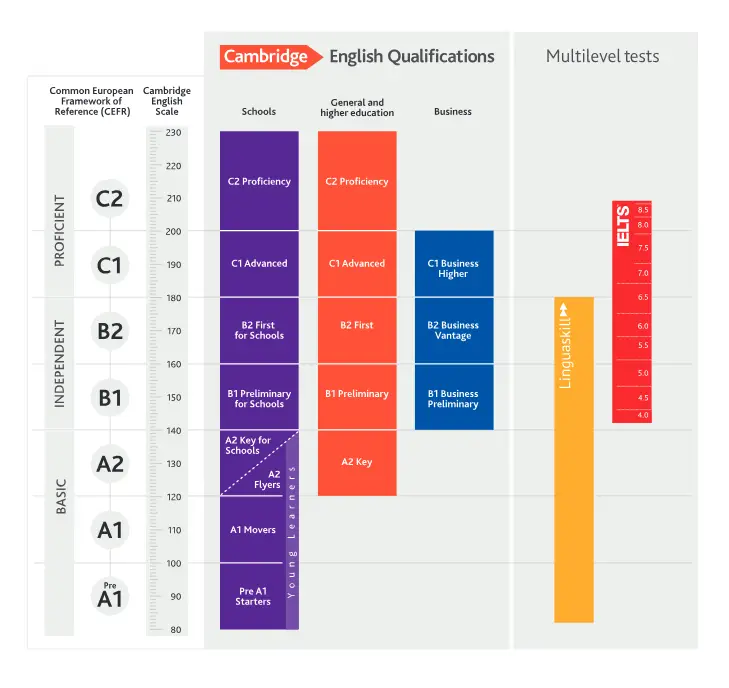Cambridge English Educational Partnership Programme
With Cambridge Assessment English, SETR's Skills Edge is committed to bringing brighter thinking from around the world into the classroom. Dedicated to better learning, we work alongside educators and learners, providing teachers and students with accessible, inspirational learning resources. With SETR's Skills Edge, we continue to unlock the potential of children of this world and help them become better citizens. In an ever-changing global educational environment, we look forward to innovating, inspiring, and leading the way in transforming education. To ensure that young learners and professionals are better equipped in all four language skills – Listening, Speaking, Reading, and Writing, we empower our educators with innovative teaching pedagogy through globally acclaimed Continuous Professional Development and Training Programs.
Cambridge English Qualifications offered by us
These three exams are for young learners in grades 3 -5. They build young learners’ confidence and lay the foundations for future success in English. All our exams for young learners are fun, colourful and activity based, motivating children to learn.

Core Modules
| Pre A1 Starters | A1 Movers | A2 Flyers | |
|---|---|---|---|
| CEFR level | Pre A1 | A1 | A2 |
| Test format | PB* | PB* | PB* |
| Number of papers | 3 | 3 | 3 |
| Total exam length | 43-45 mins | 60-62 mins | 72-74 mins |
| Reading and Writing | 20 mins | 30 mins | 40 mins |
| Listening | 20 mins | 25 mins | 25 mins |
| Speaking | 3-5 mins | 5-7 mins | 7-9 mins |

A2 Key for Schools
Suggested for Grade 6, this qualification helps learners to fully develop their everyday written and spoken English at Level A2. The exam builds on the skills students have achieved at A2 Flyers.
Exam format
| CEFR level A2 |
Reading and Writing 60 mins |
| Test format CB or PB* |
Listening 30 mins |
| Number of papers 3 |
Speaking 8-10 mins |
| Total exam length 98-100 mins |
What can learners do after achieving A2 Key for Schools?
| Typical abilities | Reading and Writing | Listening and Speaking |
|---|---|---|
| Overall general abilities |
can understand straightforward information within a known area can complete forms and write short, simple letters or postcards related to personal information |
can understand simple questions and instructions can express simple opinions or requirements in a familiar context |
| Study |
can understand the general meaning of a simplified textbook or article, reading very slowly can write a very short, simple narrative or description |
can understand basic instructions on class time, dates and room numbers can express simple opinions using expressions such as ‘I don’t agree’ |
| Social & tourist |
can understand straightforward information on food, standard menus, road signs and messages on automatic cash machines can complete most forms related to personal information |
can understand straightforward directions, provided that these are not lengthy or complex can express likes and dislikes in familiar contexts using simple language |
B1 Preliminary for Schools
Recommended for grades 7-8, this is an intermediate-level qualification for students who have mastered the basics of English and now have practical language skills for everyday use.

Exam format
| CEFR level B1 |
Reading 45 mins |
| Test format CB or PB* |
Writing 45 mins |
| Number of papers 4 |
Listening 30 mins |
| Total exam length 132 mins |
Speaking 12 mins |
What can learners do after achieving B1 Preliminary for Schools?
| Typical abilities | Reading and Writing | Listening and Speaking |
|---|---|---|
| Overall general abilities |
can understand routine information and articles. can write letters or make notes on familiar or predictable matters. |
can understand straightforward instructions or public announcements. can express simple opinions on abstract/cultural matters in a limited way. |
| Study |
can understand most information of a factual nature in his/her study area. can take basic notes in a lecture. |
can understand instructions on classes and assignments given by a teacher or lecturer. can take part in a seminar or tutorial using simple language. |
| Social & tourist |
can understand factual articles in newspapers, routine letters from hotels and letters expressing personal opinions. can write letters on a limited range of predictable topics related to personal experience. |
can identify the main topic of a news broadcast on TV if there is a strong visual element. can ask for information about accommodation and travel. |

B2 First for Schools
Suggested for grades 9 -10, this qualification is a great way for learners to prepare for higher level exams, and shows they have the language skills needed to communicate confidently in an English-speaking environment.
Exam format
| CEFR level B2 |
Reading and use of English 75 mins |
| Test format CB or PB* |
Writing 80 mins |
| Number of papers 4 |
Listening 40 mins |
| Total exam length 209 mins |
Speaking 14 mins |
What can learners do after achieving B2 First for Schools?
| Typical abilities | Reading and Writing | Listening and Speaking |
|---|---|---|
| Overall general abilities |
can scan texts for relevant information. can make notes while someone is talking, or write a letter including non-standard requests. |
can follow a talk on a familiar topic. can keep up a conversation on a fairly wide range of topics. |
| Social & tourist |
can read the media for information quickly and with good understanding. can express opinions and give reasons. |
can ask for clarification and further information, and is likely to understand the answer. can keep up a conversation on a fairly wide range of topics. |
| Study |
can make simple notes that are of reasonable use for essay or revision purposes, capturing the most important points. can present arguments, using a limited range of expression (vocabulary, grammatical structures). |
can answer predictable or factual questions. can check that all instructions are understood. |
| Work |
can understand the general meaning of nonroutine letters and understand most of the content. can write a simple report of a factual nature and begin to evaluate, advise, etc. |
can ask for factual information and understand the answer. can express own opinion and express arguments to a limited extent. |
C1 Advanced
This is proof of high-level achievement in English and the ideal qualification for students preparing for university admissions across the globe. More than 9,000 educational institutions, businesses and government departments around the world accept C1 Advanced as proof of high-level achievement in learning English.

Exam format
| CEFR level C1 |
Reading and use of English 90 mins |
| Test format CB or PB* |
Writing 90 mins |
| Number of papers 4 |
Listening 40 mins |
| Total exam length 235 mins |
Speaking 15 mins |
What can learners do after achieving C1 Advanced?
| Typical abilities | Reading and Writing | Listening and Speaking |
|---|---|---|
| Overall general abilities |
can read quickly enough to cope with an academic course. can take reasonably accurate notes in meetings or write a piece of work which shows an ability to communicate. |
can contribute effectively to meetings and seminars within own area of work or keep up a casual conversation with a good degree of fluency, coping with abstract expressions. |
| Study |
can scan texts for relevant information, and grasp main topic of text. can write a piece of work whose message can be followed throughout. |
can follow up questions by probing for more detail. can make critical remarks/express disagreement without causing offence. |
| Work |
can understand the general meaning of more complex articles without serious misunderstanding. can write a report that communicates the desired message. |
can follow discussion and argument with only occasional need for clarification, employing good compensation strategies to overcome inadequacies. can deal with unpredictable questions. |
| Social & tourist |
can understand complex opinions/arguments as expressed in serious newspapers. can write most letters they are likely to be asked to do; such errors as occur will not prevent understanding of the message. |
can pick up nuances of meaning/opinion. can keep up conversations of a casual nature for an extended period of time and discuss abstract/cultural topics with a good degree of fluency and range of expression. |

Cambridge English Scale
Cambridge English Qualifications provide reliable assessment on the Cambridge English Scale with detailed information on achievement. SETR's Skills Edge caters to qualifications from Young Learners Pre A1 Starters, A1 Movers & A2 Flyers to First for Schools for the academic year 2023-24. For educators who teach English and teach in English, it will cater to the TKT (Teaching Knowledge Test) exams.
The language skills of students and educators are assessed by external examiners who are certified by Cambridge English, ensuring a reliable evaluation process.
Benefits of Taking Cambridge English Exams:
- Seamless progression - Cambridge English exams provide a smooth pathway for students, allowing them to progress from Pre A1 Starters to C2 Proficiency levels.
- Enhanced Confidence - The exams help students build confidence in using the English language effectively.
- Real-Life Language Skills - Candidates develop practical language skills while preparing for the exams, which are applicable to real-life situations.
- International Exposure - Cambridge English exams expose students to international English and testing methods, broadening their global perspective.
- Visa Recognition - Select Cambridge English exams are recognized for visa purposes, serving as an alternative to exams like IELTS, among others.
- Global Recognition - These exams are recognized in over 130 countries, by 20,000 organisations, and have been taken by more than 5 million candidates worldwide.
- Lifelong Validity - The certificates obtained through these exams remain valid for life and are internationally accepted for work, study, and visa purposes.
- International Standards - Parents can have confidence that their children are being taught English to internationally recognized standards.